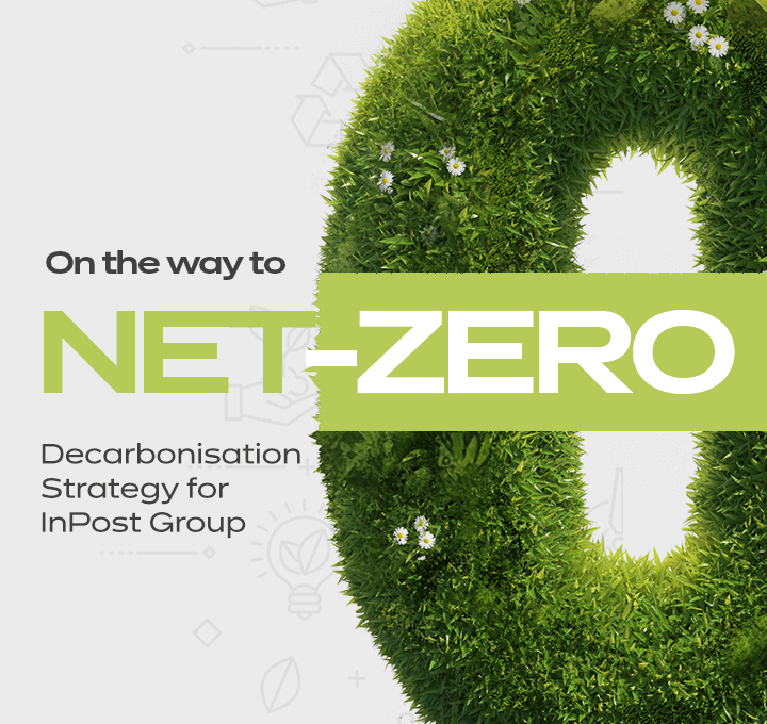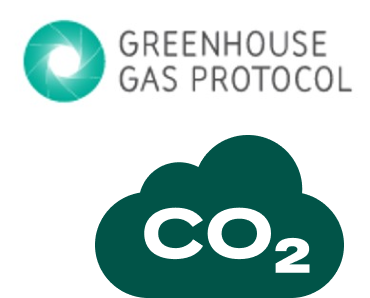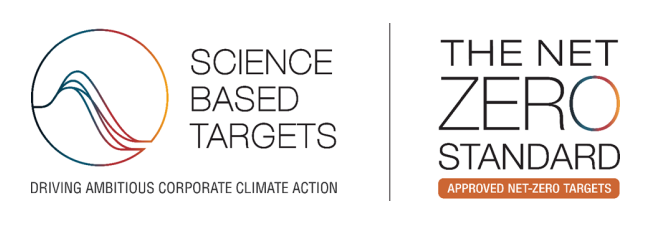

Here, at InPost Group, we use the potential of technology to shape a new, sustainable future and conduct business in a socially, economically and environmentally responsible manner. Our innovativeness is a tool for sustainable development that supports green transition.
We precisely understand our role in the face of the climate crisis, and the development of the InPost Group Decarbonisation Strategy in accordance with the Paris Agreement and the approval of reduction targets by the Science Based Targets initiative - are a natural consequence of the ESG Strategy adopted by us last year, that we put so much effort to implement.
We manage sustainability comprehensively, and issues related to the environment, corporate governance and society are part of our daily business. The InPost Group ESG Strategy developed for 2021-2026 sets out our priorities in the 3 main pillars: In_People, In_Planet and In_Client.
The ESG strategy was approved and adopted by the Management Board of the InPost Group and its Supervisory Board, was first published in the 2021 Integrated Report. The results of its implementation are monitored on a current basis and will be published annually in the InPost Group's integrated report in a transparent manner.

Nell’ambito dello sviluppo della Strategia di Decarbonizzazione, abbiamo calcolato le emissioni di gas serra per l’intero Gruppo InPost. Per noi è stato un passo da gigante verso la scoperta del nostro impatto sull’ambiente. Abbiamo misurato e aggiornato i nostri dati sull'impronta di carbonio in tre ambiti (1, 2 e 3) secondo lo standard GHG Protocol quindi sappiamo che nel 2021 l'impronta di carbonio dell'intero Gruppo è stata pari a 539.833 tCO2e.
Il nostro obiettivo è raggiungere le zero emissioni per diventare leader nell’economia a basse emissioni di carbonio. Per questo motivo, dopo aver preso coscienza dell'entità delle emissioni, tenendo conto della strategia aziendale del gruppo per gli anni successivi, il Consiglio di Amministrazione e il Consiglio di Sorveglianza ha adottato obiettivi di decarbonizzazione basati sulla scienza. Lo sviluppo di obiettivi di riduzione è stato il risultato dell'adesione all'iniziativa Science Based Targets (SBTi) nel novembre 2021. In quel momento, il gruppo InPost ha emesso una lettera di intenti in cui si impegnava pubblicamente a prefissarsi obiettivi climatici in conformità con i criteri SBTi entro 24 mesi.
Our goal is to monitor the carbon footprint for the entire organization on a regular basis, improve data quality, and report emission reductions/increases in each scope on a transparent and cyclical basis.
Greenhouse gas emissions in the InPost Group include:
Scope 1 - all direct emissions from operating activities. In the case of the InPost Group, the sources of emissions are, among others, natural gas consumption, fuel consumption in company cars and leakage of refrigerants
Scope 2 - indirect energy greenhouse gas emissions resulting from the production of purchased electricity and heat (e.g. for Paczkomat devices, offices, warehouses, branches and sorting plants)
Scope 3 - other indirect greenhouse gas emissions that occur throughout the value chain. In the InPost Group, the largest emissions in Scope 3 are generated by:
Category 4 - (Upstream transport and distribution) related to transport and courier activities 49%
Category 2 - (Capital goods) – mainly related to the production of Paczkomat® devices 44%


Major markets emissionst
I nostri obiettivi scientifici a breve termine e a zero emissioni sono stati sviluppati in conformità con i criteri scientifici sviluppati da SBTi.

What are the science based targets?
The Science Based Targets initiative (SBTi) is a global body enabling businesses to set ambitious emissions reductions targets in line with the latest climate science. It is focused on accelerating companies across the world to halve emissions before 2030 and achieve net-zero emissions before 2050. The initiative is a collaboration between CDP, the United Nations Global Compact, World Resources Institute (WRI) and the World Wide Fund for Nature (WWF) and one of the We Mean Business Coalition commitments. The SBTi defines and promotes best practice in science-based target setting, offers resources and guidance to reduce barriers to adoption, and independently assesses and approves companies’ targets. Companies' greenhouse gas emission reduction targets are considered science-based if they are in line with what the latest climate studies show is necessary to achieve the objectives of the Paris Agreement.
We are among the leaders – were over 4700 companies and institutions from around the world that joined SBTi, just only around 180 have approved NET-ZERO targets. We are the 1st Polish company with the NET-ZERO targets by 2040 approved by the SBTi and the 3rd in the logistics industry across the world that is pursuing an ambitious decarbonisation path by 2040.
as of 20.03.2023
Why do we do it?
We have it in
our DNA
Here at InPost, the Decarbonisation Strategy is closely related to our business strategy. We cannot develop without respecting the environment, especially since we know that the intensive development of e-commerce has a huge impact on it. The inclusion of the InPost Group among the members of SBTi is part of the company's current pro-ecological activities and marks an extremely important step towards full decarbonisation, which is called for by international institutions.
We care about the future of our planet
In the 2015 Paris Agreement, global governments undertook to limit the global temperature increase to well below 2°C above its pre-industrial levels and to continue their efforts to limit global warming to 1.5°C. The latest IPCC study – referred to by the UN as the 'Code Red for Humanity' – demonstrates that it is still possible to limit the global temperature increase to 1.5°C, but we are dangerously close to this threshold.
We don't have
much time
To achieve this, greenhouse gas emissions must halve by 2030 and fall to net zero by 2050. Unfortunately, we have only limited time to act, and we believe that it is the private sector that has the most significant role to play.
We have a delivery
to APMs
We are engaged in the fight against climate change - our business model helps us in this – delivery to the Paczkomat® device is the most environmentally friendly form of delivery and the development of the machine network is an example of the fight against climate change in the face of growing importance of e-commerce. We know that the climate crisis requires bold and decisive action. The targets we have set will require us to be more innovative, forward thinking, engaging our customers, suppliers and business partners.

Our climate commitments
Near-term perspective
SBTi approved science-based near-term emission reduction targets of InPost S.A. InPost S.A. commits to reduce absolute scope 1 and scope 2 GHG emissions 42% by 2030 from a 2021 base year.
InPost S.A. commits that 69% of its suppliers by emissions covering categories purchased goods and services, capital goods, and upstream transportation and distribution, will have science-based targets by 2027.

2. Long-term perspective
SBTi approved the science-based target of net-zero GHG emissions of InPost S.A. by 2040. InPost S.A. commits to reach net-zero GHG emissions across the value chain by 2040. InPost S.A. commits to reduce absolute scope 1&2 GHG emissions by 95% by 2040 from a 2021 base year. InPost S.A. commits to reduce absolute scope 3 GHG emissions by 90% by 2040 from a 2021 base year.
This is a very ambitious commitment that distinguishes the InPost Group. Only a few companies, even on the European market, have committed to achieving net-zero emissions by 2040. This means that by 2040 the InPost Group will reduce 95% of all CO2 emissions in the scopes 1&2 and 90% in scope 3. All other emissions will be neutralised in accordance with the SBTi criteria before reaching zero-net emissions.

3. Climate neutrality by 2025 (a target outside SBTi)
In order to accelerate our climate action and become a leader in the low-carbon economy, we have also committed ourselves in our ESG strategy to achieve climate neutrality by 2025 in scopes 1 and 2 – unreduced carbon emissions in scopes 1 and 2 will be offset.

How do we want to decarbonise ourselves?
- We will provide energy from renewable sources (cPPA agreements, guaranties of origin) for our branches, warehouses, offices and Paczkomat® devices both in Poland and in other markets
- We will introduce emission reduction solutions in scope 3 within the InPost Group and its value chain, including activities to support our suppliers and business partners in setting their own emission reduction targets and their implementation
- We will neutralize the residual GHG emissions from 2040 through permanent removal and storage of carbon from the atmosphere
- We will gradually replace our own combustion-engine fleet with an electric one and support our carriers in such a replacement. We are already measuring the carbon footprint emitted by the delivery of parcels in the chain (in Poland)
- We will perform energy-optimisation of our infrastructure
- We will regularly calculate the Group's carbon footprint in accordance with the GHG Protocol standard and transparently disclose the progress of target implementation
- We will periodically map the climate opportunities and risks in accordance with the recommendations of the Task Force on Climate-related Financial Disclosures (TCFD)
What projects will we engage in?
- We will work on modern R&D solutions that will reduce emissions from the production process of Paczkomat® devices and their electricity consumption during operation
- We will implement modern logistics processes that will allow us to optimize courier routes
- We will create processes of new urban logistics based on PUDO points and microelectromobility in connection with the introduction of low-emission zones
- We will invest in EV charging infrastructure
- We will expand the InPost Green City program in foreign markets – especially in France
- We will implement green services and green innovations supporting low-carbon parcel delivery and circularity
- We will educate our stakeholders - especially merchants, suppliers of products and services, individual customers and employees in the area of climate and ESG
